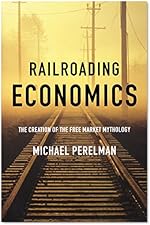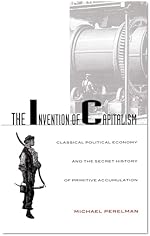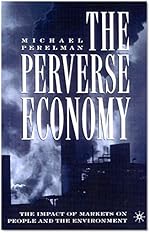Archive for August, 2008|Monthly archive page
Stock Buybacks Again
I have written a couple times about the irrationality of stock buybacks from the standpoint of corporations using their money to manipulate stocks in expectation of higher bonuses. Today’s Wall Street Journal offers another take on the subject. Besides providing a sense of the magnitude of stock buybacks, the article concentrates on the personal irrationality of corporate management, rather than the systemic irrationality of the capitalist system. In particular, the article suggests that corporations often squander money by purchasing stocks that turn out to be overpriced.
The article also offers examples of corporations purchasing unrelated corporations to make a quick buck, rather than developing their own productive capacities. My favorite example here was Exxon’s entry into the typewriter business, suggesting that the management may be so inept that stock buybacks might not be so bad. Continue reading
The Beauty of Markets and Markets of Beauty
In looking through William Stanley Jevons’ Principles of Economics, mostly a collection of unpublished fragments, Jevons concluded a section on negative value with a fascinating story from Herodotus on auctions in the Babylonian marriage market. The story speaks for itself and requires no commentary on my part.
137: “According to Herodotus the Babylonians managed to find husbands for all their young women. They collected together whatever maidens might be of marriageable years and sold them by auction, beginning with those esteemed the most beautiful. They gradually proceeded downwards in the scale of comeliness until some damsel equidistant between beauty and plainness had to be given away gratis. Then the plain and the ugly and the deformed were brought out by degrees, and the bidding went on; but in the other way, the premiums obtained for beauty being spent as dowries for the less favoured. All the women found husbands, and all the husbands found what they desired.”
Rubonomics for the People
Like many of you, I was a bit dismayed when Obama turned to Robert Rubin and his coterie for economic advice. I now admit that I was mistaken. According to Tuesday’s Wall Street Journal, Citicorp has been paying Robert Rubin $17 million a year for a part-time job with no responsibility. Judging by the company’s performance, the expectations placed on him might not be particularly high.
My full-time teaching job leaves me little spare time, but I think I could put aside a few hours each week in return for $17 million. I would be willing to take a pay cut in return for cutting back a few extra hours.
If you’re like me, and think that you would want an opportunity like that, I would hope that Pres. Obama would enact policies that would give everybody an opportunity like Robert Rubin. With this in mind, I will put myself an unofficial adviser to the Obama campaign, suggesting the slogan: Rubinomics for the People.
Go Barak!
The Mirage of Economic Efficiency
Almost 70 years ago, George Stigler introduced the concept of flexibility. A business might be highly efficient, but it may not have the flexibility to meet changing conditions. Stigler’s point is largely ignored. I would prefer that other parts of his work were ignored, but I do not have much say in such matters.
Stigler, George. 1939. “Production and Distribution in the Short Run.” Journal of Political Economy, 47 (June): pp. 304-27.
Stigler’ point is fairly simple. Nuclear power plants are often used to explain what he meant. Assume, for the sake of argument only, that a nuclear power plant can produce electricity much cheaper than other forms of generation (by the way, I do not believe this assumption is correct). The problem is that demand shifts. The capacity to produce for peak demand might not be needed 90% of the time, making it an economical.
A coal fueled plant might be far less efficient, but it can be brought online relatively quickly when it is needed. Even though the engineering efficiency of the coal-fired plant might be low, it might be appropriate for handling peak loads.
Uncertainty makes Stigler’s theory even more compelling. A biological example from my book, The Perverse Economy, might be appropriate: Continue reading
Campaign Promises
Do you know who made this extravagant campaign promise?
“We in America today are nearer to the final triumph over poverty than ever before in the history of any land. The poor-house is vanishing from among us. We have not yet reached the goal, but, given a chance to go forward with the policies of the last eight years, we shall soon with the help of God be in sight of the day when poverty will be banished from this nation.” Continue reading
The Folly of Offshore Oil Drilling
The idea that the oil companies need to get permission to drill offshore is ridiculous. The majors are more intent in using their funds to buy back their stocks to raise the share price to help boost their bonuses. Here are my notes from an interesting study from the James A. Baker III Institute for Public Policy.
Jaffe, Amy Myers and Ronald Soligo. 2007. “The International Oil Companies.” Working Paper #20. Study on the Role of National Oil Companies in International Energy Markets. James A. Baker III Institute for Public Policy, Rice University.
http://www.bakerinstitute.org/publications/NOC_IOCs_Jaffe-Soligo.pdf Continue reading
Forecasting Crises: MBA Students and Skyscrapers
Economic models are notoriously poor at forecasting severe downturns. Here are some studies that identify the kind of behavior that suggest that a crisis might be around the corner.
Broughton, Philip Delves. 2008. Ahead of the Curve: Two Years at Harvard Business School (New York: Penguin Group).
272-3: “The job statistics for our class showed that 42% went into financial services, ranging from investment banking to private equity, venture capital, and commercial banking. 21% went into consulting. There was then a steep drop to technology and telecommunications, with 6%. Pharmaceuticals, consumer products, retail, and other manufacturing each drew less than 5%. Nonprofit and government accounted for less than 5%, half of whom were part of an HBS program to place students in nonprofit and government jobs and subsidize their salaries to bring them in range of the for-profit sector. 80% of the class took jobs in the United States. The total compensation for my class in its first year out was $138,125. Ray Soifer, a graduate of the class of 1965 and a banking analyst, had been keeping track of the relationship between the condition of the American equity market and the percentage of Harvard MBA graduates choosing careers in financial services. 10% or less was a long-term buy signal. 30% or more was a long-term sell. The choices of the class of 2006 told you the markets were soon to crash.” Continue reading
Irrational Exuberance of Economsts
Stephen Mihm’s article on Nouriel Roubini reported:
“A recent study looked at “consensus forecasts” (the predictions of large groups of economists) that were made in advance of 60 different national recessions that hit around the world in the ’90s: in 97 percent of the cases, the study found, the economists failed to predict the coming contraction a year in advance. On those rare occasions when economists did successfully predict recessions, they significantly underestimated the severity of the downturns. Worse, many of the economists failed to anticipate recessions that occurred as soon as two months later.”
Does anybody know the reference?
Away with Education!
Charles Murray has an incredible proposal in Wednesday’s Wall Street Journal. He wants to do away with most undergraduate education. This idea seems quite popular at the time — at least Murray’s time. One of his colleagues, had a similar idea:
“Can there be any thing more ridiculous, than that a father should waste his own money, and his son’s time, in setting him to learn the Roman language, when, at the same time, he designs him for a trade, wherein he, having no use of Latin, fails not to forget that little which he brought from school.”
Locke, John. 1690. Some Thoughts Concerning Education in John Locke, The Works of John Locke in Ten Volumes (London): ix, pp. 1- 205, p. 153.
The core of Murray’s idea is that the purpose of education is to compare people for the workplace. Employers would be better served if prospective employees would just take tests to prove their competency.
Here is what Murray has to say: Continue reading
The Exclusion of Labor, cont.
Here is the last paragraph of what I posted earlier, plus some text that goes into more detail about the subject. Any suggestions would be appreciated.
Most economists are dismissive of any theory not built on what they consider to be solid micro-foundations — economists’ jargon for this patently unrealistic model. Mainstream economists feel threatened by the suggestion that work, workers, or working conditions could be a legitimate subject of economic inquiry. As a result, any challenges to their theoretical position get treated to a hostile reception.
In one famous case, in 1944 Richard Lester published an article questioning whether labor markets actually operated in the manner that mainstream economics suggested. Lester had extensive experience in industry after having recently served as chair of the Southern Textile Commission of the National War Labor Board. Using government data, as well as surveys of industry leaders, Lester found evidence at odds with the assumptions of mainstream economic theory (Lester 1944). For example, his results suggested that an increase in the minimum wage would have little or no effect on employment, a conclusion that infuriated major defenders of the faith, led by George Stigler, later a leader of the Chicago school of economics and a Nobel laureate (see Prasch 2007).
 Leave a comment
Leave a comment
 25 – The Confiscation of American Prosperity: From Right-Wing Extremism and Economic Ideology to the Next Great Depression
25 – The Confiscation of American Prosperity: From Right-Wing Extremism and Economic Ideology to the Next Great Depression 30 – Manufacturing Discontent: The Trap of Individualism in Corporate Society
30 – Manufacturing Discontent: The Trap of Individualism in Corporate Society Class Warfare in the Information Age
Class Warfare in the Information Age Railroading Economics: The Creation of the Free Market Mythology
Railroading Economics: The Creation of the Free Market Mythology Steal This Idea: Intellectual Property Rights and the Corporate Confiscation of Creativity
Steal This Idea: Intellectual Property Rights and the Corporate Confiscation of Creativity The Invention of Capitalism: Classical Political Economy and the Secret History of Primitive Accumulation
The Invention of Capitalism: Classical Political Economy and the Secret History of Primitive Accumulation The Perverse Economy: The Impact of Markets on People and the Environment
The Perverse Economy: The Impact of Markets on People and the Environment